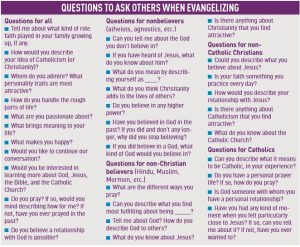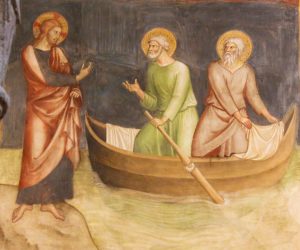
Catechists as Missionary Disciples
Marcel LeJeune
Imagine, for a moment, the perfect Catholic disciple. What would that person focus on? What would they be passionate about? What kind of activities would be at the center of such a life? What would be the core message they would teach others?
There are many answers because no two people are the same. We are all distinct and have different gifts to offer the world. However, I believe that we all share certain characteristics that flow out of the mission of the Church given to us by Jesus.
In Matthew 28:19, Jesus says, “Go, therefore, and make disciples of all nations.” This is the Church’s mission! As Blessed Paul VI put it, “Evangelizing is in fact the grace and vocation proper to the Church, her deepest identity. She exists in order to evangelize” (Evangelii Nuntiandi, 14). This missionary mandate is at the heart of all we should do as the Catholic Church, and therefore it is the mission of each Christian. Disciples need not make up any new mission statement; we have one provided for us.
Pope Francis calls each of us to take up this mandate as “missionary disciples,” which means we are not just followers (i.e., disciples) of Jesus, but sent out to be missionaries. Each of us is called to go out to others, no matter where we live or the current circumstances of our lives. By our Baptism, we have been invited into an evangelical lifestyle. Pope Francis has boldly challenged us to think creatively about how to live this out:
“I dream of a “missionary option,” that is, a missionary impulse capable of transforming everything, so that the Church’s customs, ways of doing things, times and schedules, language and structures can be suitably channeled for the evangelization of today’s world rather than for her self-preservation.” (Evangelii Gaudium, 27)
What if we were to take this challenge seriously in our lives and parishes? What would we need to change? How would we need to operate differently? What would look different in our families? How would our approach to ministry change?
A Community of Disciples
A growing number of Catholics have realized the urgency and necessity of evangelization. But due to the lack of good experiences, practices, and training, there are few who know how to evangelize very effectively. Some tend to equate evangelization with having all the right answers. I was one of these. My idea of evangelization was winning an argument or proving someone else wrong. I wasted a lot of time pushing people away, through my pride and lack of charity, before realizing my mistake.
Still others equate evangelization with teaching others in catechesis. Catechesis certainly is an indispensable moment in the process of evangelization. But it should come after an encounter with Jesus, after someone responds to Christ with personal faith. The process of evangelization, then, is built upon relationship with Christ. Catechesis ought to happen after conversion, and then be ongoing.
There are still other Catholics who believe our faith is too private to be shared with others. These Catholics do not to want to offend another person or seem too pushy. Unfortunately this can create a culture of silence, where we rarely talk about our faith, if at all. What would have happened if the Apostles had never talked about their faith? It is possible we wouldn’t have any Christians today.
What I have found works best when evangelizing others is to truly listen to the other person and to find out where they are coming from. We listen not to find an error and prove them wrong, but rather to truly accept the person who is in front of you, a person made in God’s image and likeness. Remember, to accept a person does not mean that we need to agree with all they believe in!
The Right Questions
When we evangelize, we ought to ask more questions than the other person. You can find some proposed questions in the sidebar. Note: Not all questions are appropriate for every time in a person’s life. I highly recommend you study the different thresholds of conversion, discussed in the book Forming Intentional Disciples by Sherry Weddell. These thresholds can help you determine which questions are appropriate for individuals who are in different places and with different needs.
To be good evangelists we must have good discernment about how best to help a person in each situation we encounter. So, while there are no surefire techniques or strategies that will always lead someone to conversion, there are a few things we must always do:
1. We must pray for others we are evangelizing.
2. We must live what we believe.
3. We must look for the opportunity to proclaim the Good News.
I believe Catholics really are getting better at voicing the kerygma — the initial proclamation of the Good News of Jesus Christ. More people are comfortable doing so and are learning more effective ways of doing it. Furthermore, most people understand that free will works in union with grace. It is every person’s choice whether to say yes to God’s grace.
Kerygma
Kerygma is a Greek word meaning “proclamation.” It is the preaching of the Good News of salvation, the proclaiming of the essential elements God’s plan of salvation in Christ. It is the passing on of the core message of the Gospel. (Refer to the Catechism of the Catholic Church, 1-3.)
However, some Catholics still stop too short when they get to this point. Let us not being afraid to offer an opportunity to someone to respond to God!
Choosing to say yes to God makes all the difference, so why aren’t we offering more opportunities to others to make this choice? It can be as simple as asking, “Would you like to turn your life over to God?” or something similar. I understand the reasons why someone might avoid or choose not to do this. Do any of these sound familiar?
1. We are uncomfortable with asking because we don’t know what it looks like ourselves.
2. We find ourselves not wanting to be “pushy.”
3. We are afraid they might say no.
4. We believe it sounds “too Protestant.”
Instead of these excuses, let’s allow the Word of God to urge us on. Let’s look at some of the biblical evidence where God invites hearers to respond. Examine these two examples where we learn how Jesus called the first apostles.
“[Jesus] said to them, “Come after me, and I will make you fishers of men. At once they left their nets and followed him” (Matthew 4:19).
“After this he went out and saw a tax collector named Levi sitting at the customs post. He said to him, “Follow me.” And leaving everything behind, he got up and followed him” (Luke 5:27-28).
Scripture also shows us that not everyone chooses to follow Jesus, as in the case of the rich young man.
“Jesus said to him, “If you wish to be perfect, go, sell what you have and give to [the] poor, and you will have treasure in heaven. Then come, follow me.” When the young man heard this statement, he went away sad, for he had many possessions” (Matthew 19:21-22).
The apostles and the rich young man had to personally respond to the call of God for grace to be set free within them. Some choose to say yes; some do not.
Just as Jesus modeled it, we too need to respect another’s freedom — and this allows them the freedom to say no. 
Urged On By Love
It’s true that Catholics do not believe in “once saved, always saved,” as we might have heard from some non-Catholic friends. But make no mistake, we do believe in choosing Jesus. It’s foundational. And it’s found early in the Catechism of the Catholic Church:
“Those who with God’s help have welcomed Christ’s call and freely responded to it are urged on by love of Christ to proclaim the Good News everywhere in the world” (CCC, 3).
Ask yourself:
■ How can you, as a catechist, help those you serve?
■ What do you need to do to help others choose Jesus?
■ How can you plan formation lessons that better include the kerygma?
■ How can you be a missionary disciple this week, urged on by love?
MARCEL LEJEUNE, MTS, is the president and founder of Catholic Missionary Disciples. His great passion is Jesus and making him known. Marcel is an evangelist, international speaker, author of three books, and contributor to several others. He is a husband and father of five. Find out more at CatholicMissionaryDisciples.com.
PHOTO: GEORGE MARTELL/BAYARD INC
PHOTO: JORISVO/SHUTTERSTOCK
This article was originally published in Catechist magazine, April-May, 2018.




